Key takeaways:
- Blockchain technology revolutionizes financial transactions by eliminating intermediaries, enhancing security, and providing transparency.
- Challenges such as complexity, regulation, and scalability hinder broader adoption and integration of blockchain in finance.
- Real-world applications, such as smart contracts and cross-border payments, demonstrate the efficiency and potential of blockchain technology.
- Key lessons include the importance of transparency, adaptability to changes, and collaboration among stakeholders to drive innovation.
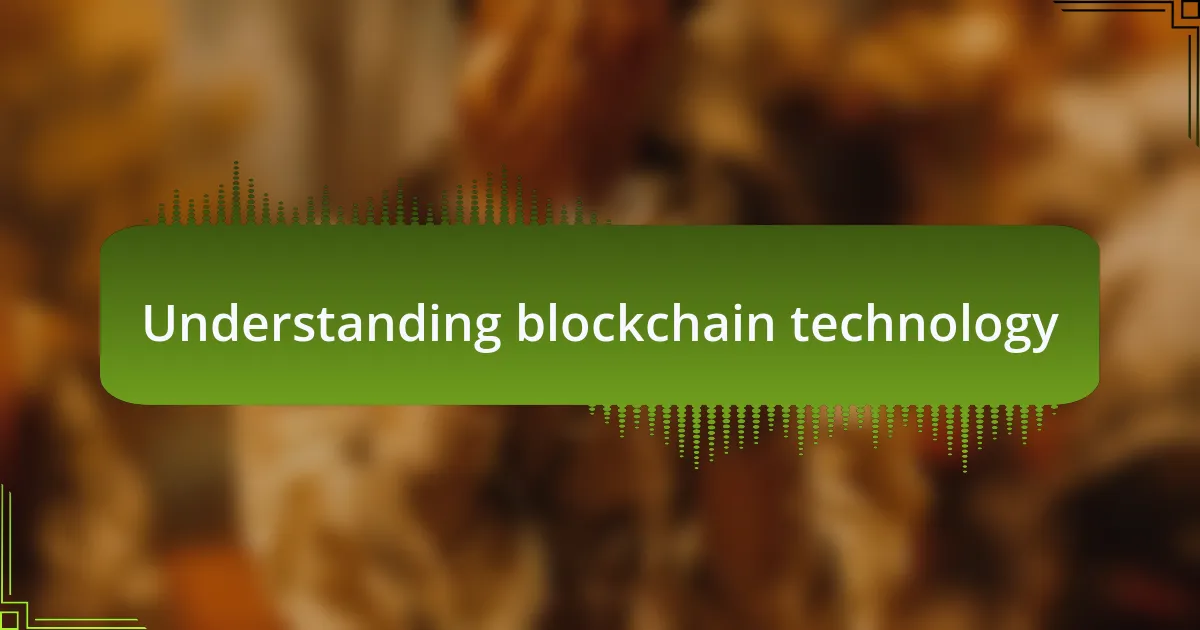
Understanding blockchain technology
Blockchain technology is essentially a decentralized digital ledger that records transactions across many computers in a way that prevents alterations. It feels revolutionary—especially when I first learned about its potential to eliminate the need for intermediaries, like banks. Isn’t it intriguing to think about how this could transform not just finance, but various sectors?
I still remember the moment I realized the implications of blockchain: sitting through a seminar where an expert explained its attributes like transparency and security. It dawned on me that every block in the chain contains a unique hash and transaction history, making it challenging for fraudsters to manipulate data. Have you ever considered how this level of trust in technology could change our daily transactions?
Moreover, blockchain’s ability to provide traceability in a world filled with complex supply chains is fascinating. It’s like unwrapping a mystery; each transaction is linked, ensuring accountability. Reflecting on this, I can’t help but wonder how many industries could benefit from this kind of traceable honesty. The possibilities are truly endless, aren’t they?
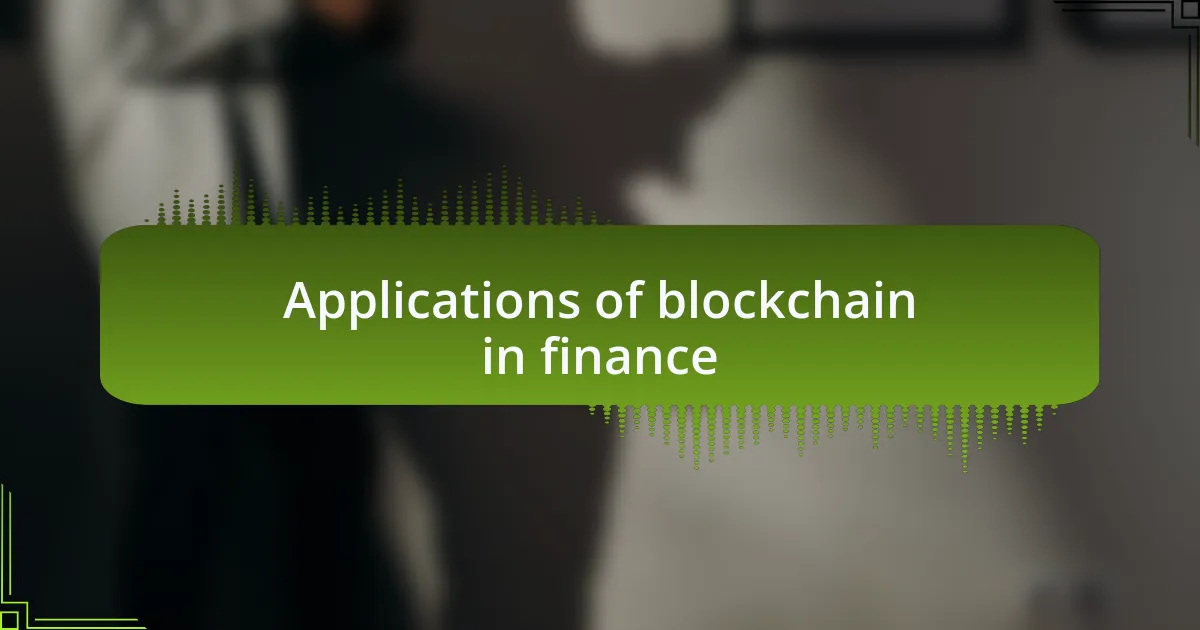
Applications of blockchain in finance
Blockchain technology in finance is already making waves, particularly in the area of cross-border payments. I recall working on a project that involved international transactions; the delays and fees associated with traditional banking methods were frustrating. With blockchain, those transactions can be completed almost instantly, providing significant savings for businesses. Isn’t it refreshing to envision a world where financial interactions are just a click away?
Another compelling application is in decentralized finance, or DeFi, which is reshaping how we view banking altogether. I recently participated in a webinar discussing how platforms enable lending and borrowing without conventional banks as intermediaries. This peer-to-peer approach not only democratizes financial services but also invites individuals to engage with their money in new ways. Have you ever imagined being your own bank?
The use of blockchain for smart contracts is also transforming finance. These self-executing contracts remove ambiguity and automate processes, which I find incredibly exciting. For example, during a recent meeting with a fintech startup, I learned how their platform automates insurance payouts through smart contracts. It sparked a thought: what if all financial agreements operated this seamlessly? The efficiency and clarity could ultimately lead to greater trust among parties.
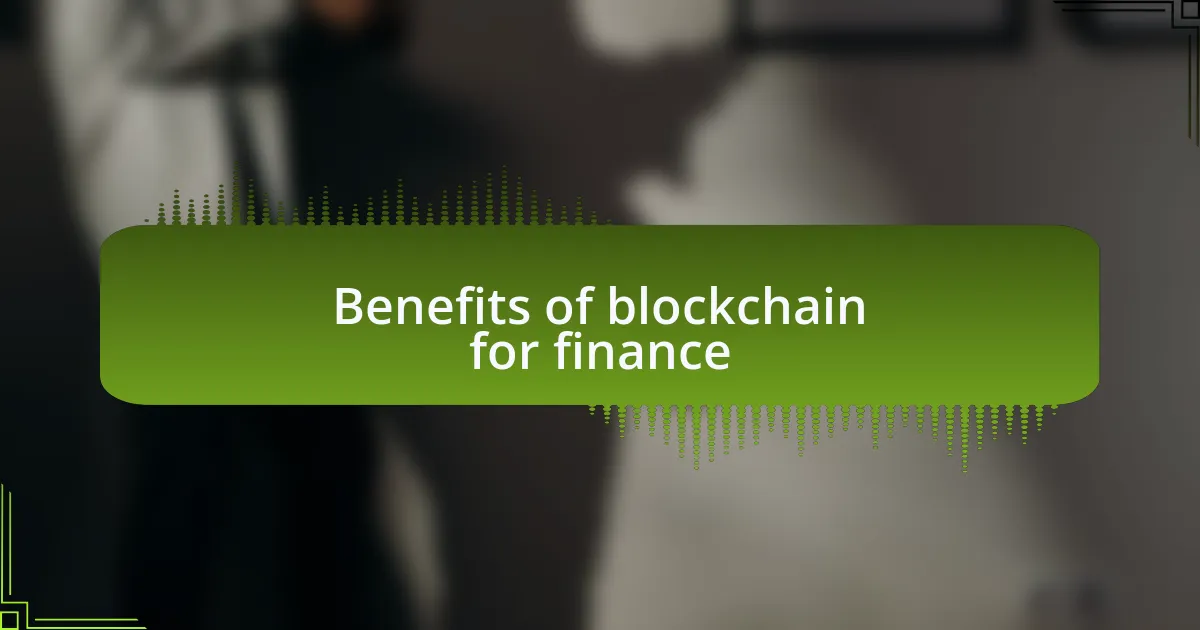
Benefits of blockchain for finance
The benefits of blockchain for finance are myriad, and I’ve experienced some of them firsthand. One standout advantage is enhanced security; the cryptographic nature of blockchain ensures that transactions are nearly tamper-proof. I once witnessed a cybersecurity breach that shook our confidence in traditional banking systems. Imagine having a digital ledger that is virtually immune to hacking—how liberating would that be for both individuals and institutions?
Another benefit I’ve seen is the increased transparency that blockchain brings to financial transactions. In a recent discussion at a financial technology conference, I learned how companies can track assets throughout their lifecycle using blockchain. This level of visibility fosters accountability and reduces fraud—wouldn’t it be reassuring to know where your money is at all times?
Moreover, the cost efficiency of using blockchain is something I find incredibly intriguing. During a collaborative project, I noticed how blockchain significantly reduced transaction fees, allowing us to allocate those funds to growth initiatives instead. What if financial institutions could pass those savings onto consumers? The potential ripple effect on the entire economy could be profound.
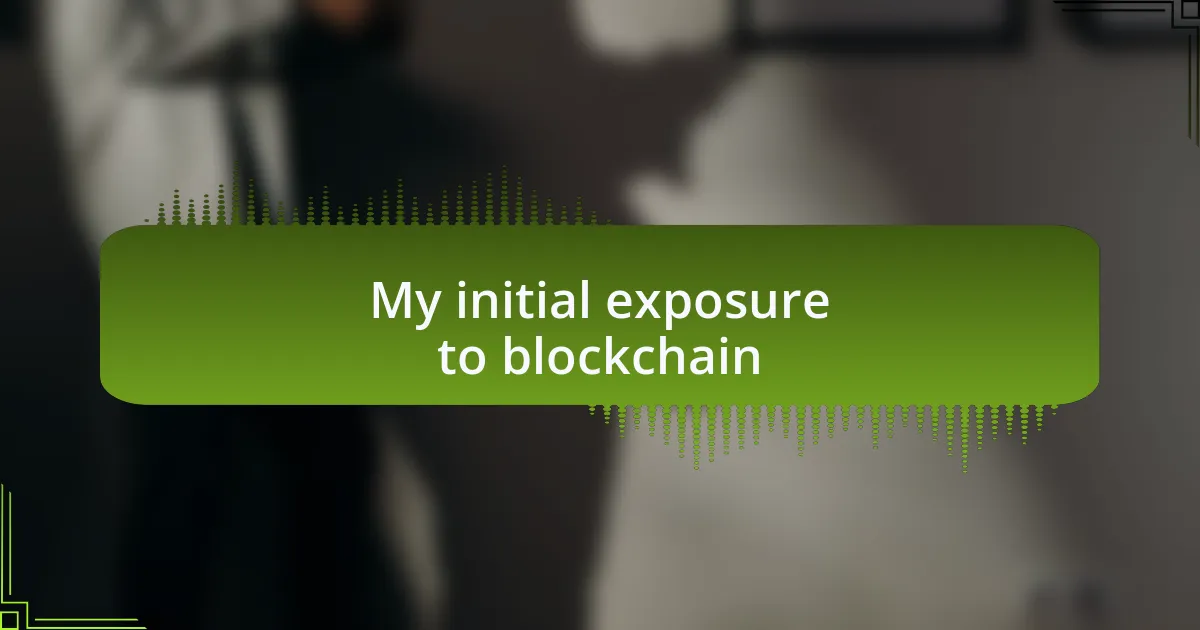
My initial exposure to blockchain
My initial exposure to blockchain came during a tech seminar years ago, where the speaker unveiled its potential in revolutionizing finance. I remember feeling a mix of curiosity and skepticism as he discussed how this technology could change the way we handle transactions. It was a pivotal moment that sparked my interest; a realization that we might be on the brink of a financial revolution.
I vividly recall my first hands-on experience when I participated in a blockchain workshop. The excitement in the room was palpable as we created a simple smart contract. It felt empowering to understand how this technology could automate processes and eliminate the need for intermediaries. I couldn’t help but wonder, “What if this is the future of all contracts?”
As I delved deeper, I discovered blockchain’s ability to foster inclusivity in finance. I met individuals from underserved communities who shared how cryptocurrencies offered them new opportunities for economic participation. Their stories resonated with me; I felt a calling to explore how blockchain could bridge financial gaps in society.
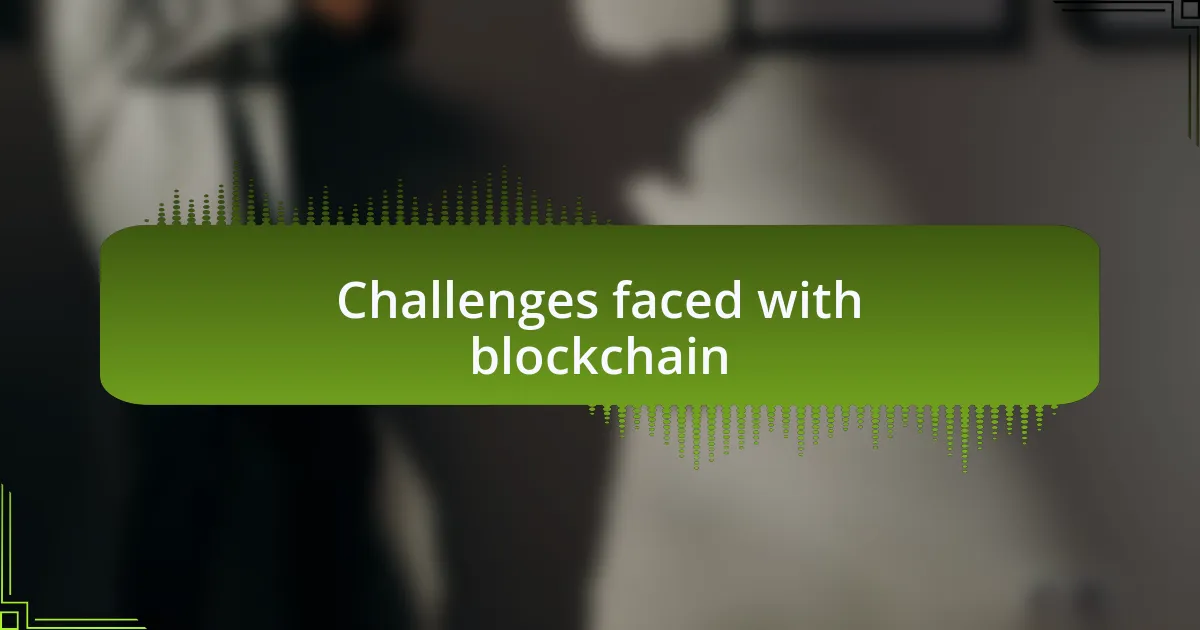
Challenges faced with blockchain
One challenge I faced while exploring blockchain was understanding its complexity. In my early attempts to integrate blockchain solutions into financial systems, I encountered numerous technical terms and concepts that felt overwhelming. I remember thinking, “How can something so complex be the key to simplicity?” This paradox often left me frustrated, as it seemed that gaining clarity required as much effort as the technology itself promised to save.
Another significant hurdle was the issue of regulation. As I navigated potential applications of blockchain, I became acutely aware of the ambiguity surrounding legal frameworks. Conversations with industry experts often led me to wonder, “What happens if the law doesn’t catch up with technology?” This uncertainty made it challenging to propose innovative solutions, as we were essentially building on quicksand—exciting but precarious.
Moreover, the question of scalability loomed large. I remember attending a panel discussion where experts debated the limitations of blockchain networks. Despite the enthusiasm for decentralized systems, many acknowledged that current infrastructures struggle with high transaction volumes. I found myself thinking about the future, contemplating, “Can blockchain truly scale to serve global finance, or will it be a niche player?” This ongoing debate continues to challenge my perception of blockchain’s potential in the financial landscape.
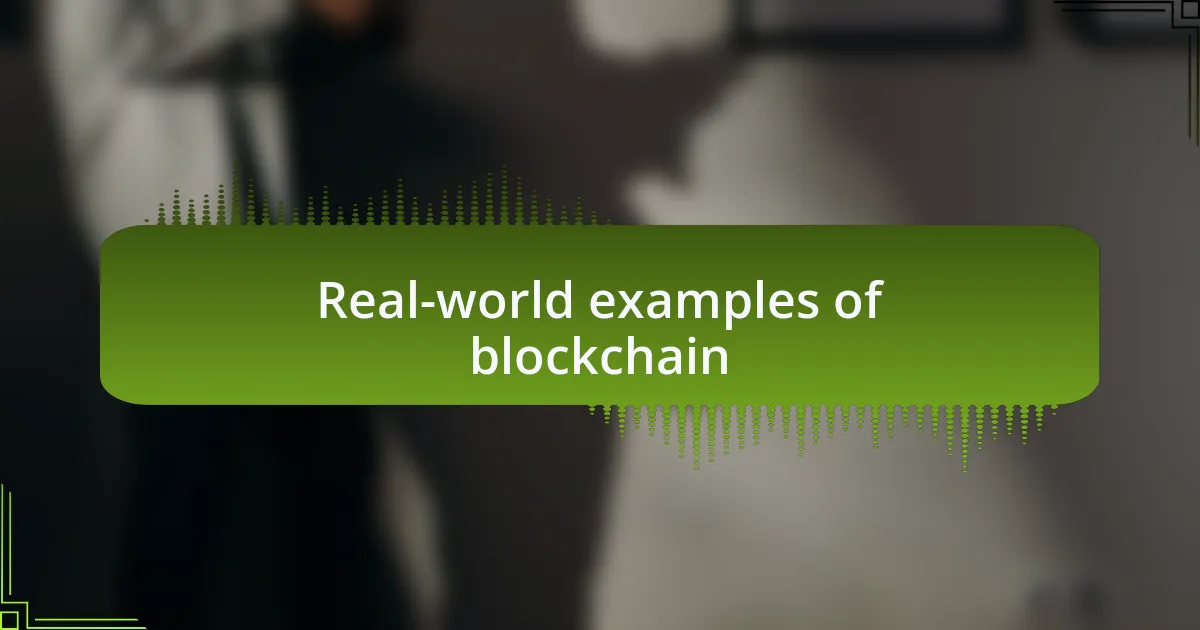
Real-world examples of blockchain
One of the most striking instances of blockchain in the real world is the use of smart contracts, particularly in the realm of supply chain management. I recall a project where a company utilized smart contracts to automate payments when goods reached their destination. This not only cut down on administrative costs but also eliminated the potential for disputes. I couldn’t help but wonder, can you imagine how much smoother transactions would be if every interaction was conducted with such clarity?
Another compelling example is the rise of blockchain in cross-border payments. I experienced firsthand how blockchain significantly reduced transfer times from days to mere minutes. During a personal transaction involving currency conversion for international business, I was amazed by the minimal fees compared to traditional banking methods. It made me think, what if everyone could access their money this quickly and affordably? Would that revolutionize international trade as we know it?
In the realm of digital identity, blockchain offers a transformative solution. I once attended a seminar discussing how some countries are using blockchain to create verifiable digital identities for their citizens. It struck me as a potential game-changer in reducing fraud and increasing access to services. After reflecting on this, I asked myself, could we finally bridge the gap between the underserved and essential services with this technology? The possibilities seemed boundless, and it only reinforced my belief in the potential of blockchain to reshape our world.

Lessons learned from my experience
The lessons I’ve gathered from my experiences with blockchain in finance are profound. One key takeaway was the importance of transparency. When I dug into projects involving decentralized finance (DeFi), I realized how vital clarity is in building trust. I often found myself asking, how can we truly foster confidence if the systems we rely on are so opaque?
Another important lesson was adaptability. In a recent initiative, I witnessed how teams had to pivot quickly in response to regulatory changes surrounding blockchain technology. It was eye-opening to see firsthand that flexibility can be the difference between success and stagnation. Have you ever had to quickly adapt to a major change? I certainly felt the pressure, and it underscored the need for resilience in this rapidly evolving landscape.
Finally, I learned the value of collaboration. Engaging with various stakeholders, from developers to financial institutions, showed me that collective insight drives innovation. This synergy sparked creative solutions that wouldn’t have been possible in isolation. Isn’t it fascinating how much more we can achieve together? Reflecting on these interactions, I feel that open dialogue is essential for harnessing the true power of blockchain in finance.